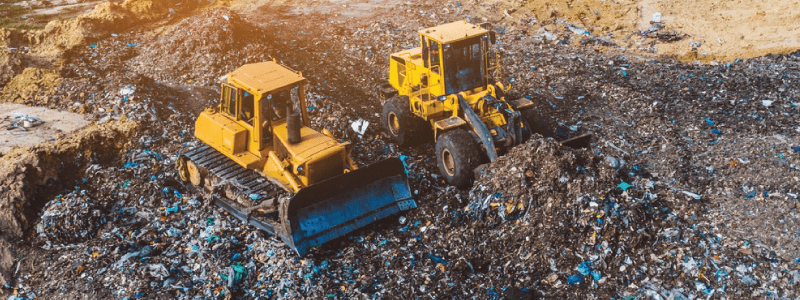
What Is Landfill Tax? A Quick Explanation
20th Apr, 2018
It’s a pretty universal truth that nobody likes landfill. It’s mostly regarded as a necessary evil, a last resort for waste disposal that can’t be effectively reused, salvaged or recycled elsewhere. It’s an issue we’re keenly aware of here at Skip Hire Network, and we’ve actually set ourselves the mission of ultimately diverting 100% of waste from landfill – a goal we’re working towards all the time!
Essentially, the Landfill Tax is a longstanding piece of legislation that’s been introduced in the UK to discourage the amount of waste sent to landfill. In this post we’ll cover some of the most commonly asked questions about Landfill Tax, including:
- When was Landfill Tax introduced?
- Who pays Landfill Tax?
- What’s exempt from Landfill Tax?
- How much is Landfill Tax?
- When does Landfill Tax go up?
So…ready to get the answers to your questions?
1. When Was Landfill Tax Introduced?
The UK’s Landfill Tax was first introduced on the 1st of October 1996. As for why Landfill tax was introduced – its stated aim is to encourage waste producers and the waste management industry to switch to more sustainable alternatives, mainly by making it more expensive to send waste to landfill. For decades before that, landfill was seen as the cheap and easy option (and in many cases, sadly still is) so the Landfill Tax also gradually rises year on year to make landfill steadily less attractive.

Although there have been improvements in landfill management in recent years, there’s no denying their long laundry list of negatives. They’re notoriously ugly and can severely impact the surrounding environment (especially if not managed correctly), and can even be an active threat to human health. They’re a big factor in ongoing climate change, as well as taking up ever-increasing amounts of space. At its core, the Landfill Tax aims to limit our reliance on landfills for waste disposal, and therefore limit their harmful effects. Solid thinking, really.
2. Who Pays Landfill Tax?
Businesses, local authorities and waste management service providers (such as skip hire companies like ourselves) are the people who chiefly pay Landfill Tax. It doesn’t directly affect homeowners, households or individuals, in case that’s what you’re wondering.
Landfill Tax applies to all waste disposed of in licensed landfill sites either on or after the 1st of October 1996 (otherwise known as ‘all the time, right now’). The only time Landfill Tax doesn’t apply at all is if the waste is specifically exempt. We’ll come onto what’s exempt in a moment, but first, we’ll explain the rates. Essentially, Landfill Tax is split into two main rates: a Standard Rate and a Lower Rate.
- Standard Rate: Applies to all taxable waste that’s disposed of at authorised landfill sites, as we outlined above
- Lower Rate: This applies to specially qualifying materials that are specifically classed as ‘less polluting’ by the official legislation.
To sum them up quickly, ‘less polluting’ materials include:
- Rocks and soils
- Ceramic or concrete material
- Minerals
- Furnace slags
- Ash
- Calcium sulphate
- Calcium hydroxide and brine

Those are just general categories, though. If you’re wondering about a specific material, you might well want to look at this section of the General Guide To Landfill Tax by the HMRC. Speaking of which…
3. What’s Exempt From Landfill Tax?
There are a number of materials exempt from landfill tax for various reasons, most of which depend on its inertness, or potential for reuse elsewhere. These exemptions include:
- Dredgings – defined as material removed from water or waterways. That means rivers, canals, docks or harbours
- Mining and quarrying material
- Pet cemeteries (though there may be some exceptions)
- Inactive waste, used for filling quarries
- Waste produced by visiting military forces
It’s worth noting that individual exceptions from Landfill Tax aren’t unheard of, but on the whole you’ll find that these rules tend to be pretty unflinching.
4. How Much Is Landfill Tax?
It changes from year to year. In the annual Budget announcement in June 2010, it was announced that the standard rate of Landfill Tax would rise by £8 per tonne each year, up to and including 2014. Though the rises since 2014 haven’t been quite as steep, they have been consistent. There’s also a ‘floor’ under the standard rate, so that it doesn’t fall below £80 per tonne until at least 2020.

The last few years are below:
April 2016
- Standard rate: £84.40 per tonne
- Lower rate: £2.65 per tonne
April 2017
- Standard rate: £86.10 per tonne
- Lower rate: £2.70 per tonne
April 2018
- Standard rate: £88.95 per tonne
- Lower rate: £2.80 per tonne
5. When Does Landfill Tax Go Up?
The amount is revised on the 1st of April every year, which means we had our last rise quite recently in 2018. The next rise is set to be about 12 months from now, and if current trends are anything to go by, the Landfill Tax will probably rise to over £90 per tonne.
Don’t forget, if you’re a business owner looking to get rid of commercial waste or corporate refuse, look no further. Commercial waste management is something of a specialty of ours here at Skip Hire Network. In fact, we’re the first choice for a number of UK household names, including Vodafone, Forest Holidays and United Utilities. You can read more about our amazing service by clicking the link above, or just head on over to our homepage and enter your postcode and phone number to get started!